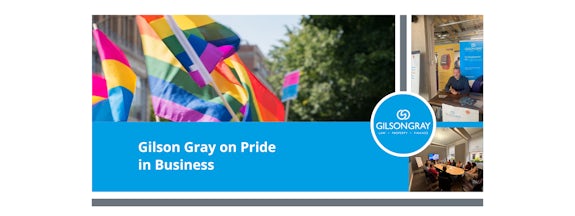Last weekend, Glasgow came alive as tens of thousands of participants flooded the streets to celebrate one of the most iconic events of the year – Glasgow Pride. We were delighted to be sponsors of the Mardi Gla event and had a presence in the Event Hub at Strathclyde University, where the marchers gathered afterwards to share their experience of the day.
On the lead up to Mardi Gla, we hosted a Pride in Business roundtable discussion in our Glasgow office which saw representatives from business supporters of the event gather with the aim of fostering meaningful discussion on promoting equality, sharing best practice, and exploring practical approaches to embedding inclusion and diversity within our respective organisations.
As the discussions unfolded, several key findings emerged, shedding light on critical aspects that organisations must address to achieve true inclusivity:
The Legal Framework and the Role of Reporting
The legal framework concerning diversity and inclusion is still a work in progress. Laws tend to lag behind the pace of social movements. However, businesses have an opportunity to take the lead and actively foster inclusivity. The move to mandatory reporting has had a positive impact. Reporting helps identify areas for improvement and acts as a driving force for senior leaders to initiate change. However, it’s essential to address those who choose not to participate in surveys and find ways to interpret and utilise the data effectively.
Moving from Compliance to Real Change
Transitioning from compliance to living and breathing diversity and inclusion requires conscious effort and tangible actions. Creating a safe environment for employees to express their perspectives is crucial. Additionally, reviewing the recruitment process is essential to ensure underrepresented groups have equal opportunities and are represented in leadership positions. Considering the needs of customers and embracing representatives who share similar backgrounds or protected characteristics can create a more empathetic and understanding business culture.
Understanding Diversity, Equity, and Inclusion
The Equality Act 2010 outlines “protected characteristics,” but it’s important to expand our understanding of diversity. Gender identity, social and demographic backgrounds, and neurodiversity are crucial aspects that need recognition and inclusion.
Addressing Wider Social Issues
Ethnicity and disability remain underrepresented in the workplace. Combating gender-based harassment and discrimination is vital. Businesses must proactively take steps to address these issues and create a more inclusive environment
Practical Steps Towards Positive Change
Implementing practical steps is essential in making progress. Regular monitoring and surveys allow companies to track their diversity and inclusion efforts. Setting clear targets helps guide the path forward, and reviewing recruitment and promotion practices ensures fairness and equal opportunities.
Nurturing an Inclusive Workplace Culture
Workplace culture plays a pivotal role in promoting diversity and inclusion. Business owners and senior leaders should drive the change and be accountable for fostering an inclusive culture. Education and experience are key drivers in setting the right workplace culture.
The Role of Equality and Human Rights Commission
Within the workplace, everyone should treat colleagues with dignity and respect. Workplace Equality Champions can act as ambassadors, further fostering inclusivity throughout the organisation.
Training for Awareness and Understanding
Policies alone are insufficient. Training employees on topics like unconscious bias helps dispel myths, combat ignorance, and instil a sense of shared responsibility in driving positive change.
Taking Positive Action
Moving beyond compliance requires taking real action. A roundtable discussion highlighted the numerous positive steps taken by various organisations to create a genuine difference in fostering diversity and inclusion.
If you are interested in discussing this topic further, please contact Graham Miller, our Employment Law Partner at gmillar@gilsongray.co.uk.








